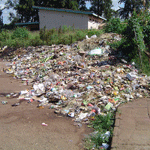
The corporate sector should also be at the forefront of championing a cleaner environment by adopting zero tolerance to littering. This should form the core part of their targets for 2013.
Companies can identify key problem areas that local authorities are struggling to address, such as the lack of garbage compactors and waste receptacles, especially in areas of high human traffic including market places, tollgates, etc, and assist in addressing those challenges as part of their social responsibility.
Some companies are even taking their donated bins as a way of advertising their brands.
However, companies should also realise that bin installation on its own is not enough to address the litter challenges.
Even if there are a sufficient number of bins, the problem of littering will not be effectively addressed if those bins are not regularly emptied by the responsible authorities.
Corporates can also help raise people’s awareness on waste management, using their packaging as this is an effective way of reaching out to their customers.
Pick n Pay supermarkets, for example, have embraced this well by branding the three ‘R’s of waste management in their packaging.
At the national level, the government should update the Environmental Management Act (20:27) and encourage the various local authorities’ by-laws to empower the country’s residents to have arresting powers that will help in bringing those who litter (litterbugs) to task.
- Chamisa under fire over US$120K donation
- Mavhunga puts DeMbare into Chibuku quarterfinals
- Pension funds bet on Cabora Bassa oilfields
- Councils defy govt fire tender directive
Keep Reading
More so, the US$20 fine enforced by EMA is not prohibitive enough to deter people from littering.
Law enforcement and political will supposed to play a central role Experiences from other countries in Africa show that law enforcement and political will is the key to addressing litter problems.
In Botswana, for example, deposition of litter illegally is a serious offence.
Section 8 of that country’s Waste Management Act of 1998 (65:06) states that “any person [found] guilty of depositing waste on land which gives rise to the pollution of the environment or harm to human, animal or plant life, shall upon conviction be liable to a fine not exceeding BWP14 000 (approximately US$1 750) or to imprisonment for a term not exceeding 10 years.”
Therefore, Zimbabwe’s environmental legislation should be tough on litterbugs to deter them from illegal dumping of waste.
In August this year, Zimbabwe will host the United Nations World Tourism Organisation (UNWTO) meeting.
Therefore, it is important to ensure that the environment is clean as this will help market the Zimbabwean brand and encourage future tourists’ inflow.











